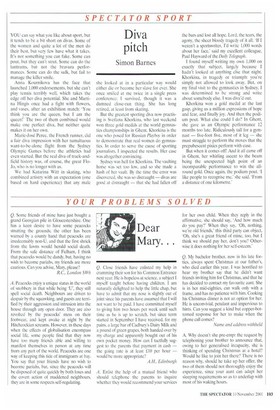Diva pitch
Simon Barnes
YOU can say what you like about sport, but it tends to be a bit short on divas. Some of the women and quite a lot of the men do their best, but very few have what it takes. It's not something you can fake, Some can pout, but they can't strut. Some can do the tantrums, but not the bravura performances. Some can do the sulk, but fail to manage the killer smile.
Anna Kournikova has the face that launched 1,000 endorsements, but she can't play tennis terribly well, which takes the edge off her diva potential. She and Martina Hingis once had a fight with flowers, and vases, after an exhibition match: You think you are the queen, but I am the queen!' The two of them combined would make one perfect diva, but neither quite makes it on her own.
Marie-Jose Perec. the French runner, did a fair diva impression with her tumultuous want-to-be-alone flight from the Sydney Olympic Games before the athletics had even started. But the real diva of track-andfield history was, of course, the great FloJo, who is no longer with us.
We had Katarina Witt in skating, who combined artistry with an expectation (one based on hard experience) that any male she looked at in a particular way would either die or become her slave for ever. She once smiled at me twice in a single press conference; I survived, though it was a damned close-run thing. She has long retired, at least from skating.
But the greatest sporting diva now practising is Svetlana Khorkina, who last weekend won three gold medals at the world gymnastics championships in Ghent. Khorkina is the one who posed for Russian Playboy in order to demonstrate that real women do gymnastics. In order to serve the cause of sporting journalism, I inspected the results. Her case was altogether convincing.
Sydney was hell for Khorkina, The vaulting horse was set too low, and so she made a hash of her vault. By the time the error was discovered, she was so distraught — divas are good at distraught — that she had fallen off the bars and lost all hope. Lord, the tears, the agony, the sheer bloody tragedy of it all. If I weren't a sportswriter, I'd write 1,000 words about her face,' said my excellent colleague, Paul Hayward of the Daily Telegraph.
I found myself writing my own 1,000 on exactly that subject, largely because I hadn't looked at anything else that night. Khorkina, in tragedy or triumph: you're simply not allowed to look away. But, on my final visit to the gymnastics in Sydney, I was determined to be strong and write about somebody else. I was diva'd out.
Khorkina won a gold medal at the last gasp, giving us a million expressions of hope and fear, and finally joy. And then the podium pout. What else could I do? In Ghent, she gave us an Olympic performance 12 months too late. Ridiculously tall for a gymnast — five-foot five, most of it leg — she must struggle to perform the moves that the prepubescent pixies perform with ease.
But when it comes off! And it all came off in Ghent, her whirling ascent to the beam being the unexpected high point of an incomparable performance to win the allround gold. Once again, the podium pout. 'I like people to recognise me,' she said. 'From a distance of one kilometre.'














































































































 Previous page
Previous page